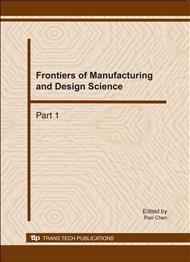p.3469
p.3473
p.3478
p.3483
p.3487
p.3492
p.3497
p.3502
p.3508
Multi-Objective Optimization Algorithm for Instrument Integrated Development
Abstract:
The integrated technology is the main way for the instrument development. The combination of networked collaborative design and multi-objective optimization method, considering the different product design and development of individual fitness degree, to provide the best integrated development for the product solution. The system of Flexible integrated knowledge management was built for networked collaborative design. The system architecture is flexible hub, to support the collaborative development of decision-making and optimal design of innovative integrated development. Innovative multi-objective optimization algorithm also was established based on networked collaborative design. It is realized to obtain fast convergence of the optimal solution set for Knowledge groups. The individual goals, to achieve the optimal design of integrated development, were achieved.
Info:
Periodical:
Pages:
3487-3491
Citation:
Online since:
December 2010
Authors:
Price:
Сopyright:
© 2011 Trans Tech Publications Ltd. All Rights Reserved
Share:
Citation:


